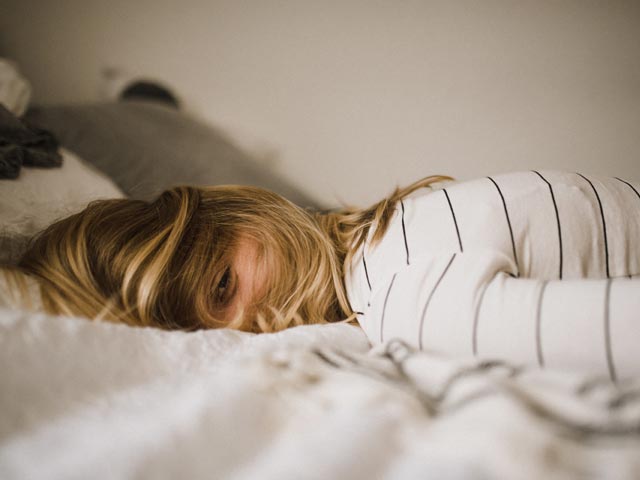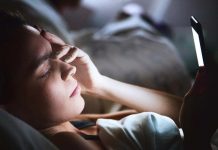What Healthy Sleep Looks Like
Difficulty sleeping isn’t normal, but it is common. According to the Centers for Disease Control, 35 percent of Americans aren’t getting at least seven hours of sleep each night. But seven hours is what the CDC considers a healthy sleep duration.

Image Credit: Unsplash
When you don’t get at least seven hours of sleep each night, you’re at an increased risk of developing chronic conditions that can have serious implications. Heart disease, high blood pressure, obesity, diabetes, stroke, and frequent mental distress are some of the conditions with increased risk factors when you’re not sleeping well.
But time isn’t the only factor in healthy sleep. To truly get the rest you need, you need at least seven hours of good quality sleep. That means you need to spend an appropriate amount of time in deep sleep to feel truly restored. That may not happen if you’re in and out of sleep and experiencing poor sleep quality at night.
How Diet Influences Sleep
You may know that sleep influences your diet. In general, when you sleep well, you’re in a better position to eat well and be less tempted by junk food or overeating to make up for a lack of energy from not getting enough sleep. But there’s a flip side to food and sleep: what you eat can influence your sleep, just like sleep can influence what you eat.
Sleep struggles can be brought on by what you’re eating or drinking. Some of the most serious offenders are caffeine, alcohol, spicy foods, overly fatty foods, and sugary junk foods.

Image Credit: Unsplash
Caffeine can leave you feeling too wired to get to sleep, especially if you’re consuming it within a few hours (sometimes even several hours) of bedtime. Alcohol may help you fall asleep easily by inducing drowsiness, but may result in poor sleep quality. When you fall asleep under the influence, your sleep is lighter and you’re more susceptible to waking up in the middle of the night.
Spicy foods can affect acid reflux and heartburn, which can keep you up at night. But even if you don’t typically suffer from those conditions, spicy food can still steal away restful sleep time by increasing your internal body temperature. Your body needs to lower its temperature for restful sleep.
Fatty foods, sugary foods, and food overall considered junk food can be more difficult for your body to process. While you may be able to handle the more difficult processing during the day, it’s tougher at night. Your body needs to focus on rest, but instead has to work harder on digestion. Your sleep quality may be lower as your body processes fatty food, with potentially lighter sleep and more nighttime awakenings.
But even water, which is considered healthy, could be a problem for sleep if you’re drinking too much just before bed. That can leave you running to the bathroom all night. Or, eating a large healthy meal before bed could have you too full to sleep comfortably and get the good quality rest you need. So the timing of what you eat plays a part almost as much as what you’re eating.
Eating And Sleeping Well
Eating a well balanced diet is a good way to support healthy sleep. In general, foods that are considered part of a healthy diet are considered to be good for sleep. Specifically, you’re looking for foods that contain ingredients including tryptophan, carbohydrates, calcium, magnesium, melatonin and Vitamin B6 to support good sleep.
You can find these ingredients in dairy products including milk, cheese, and yogurt, lean protein including eggs and fish, fruits and vegetables including kale, cherries, bananas, and tomatoes, and starches and whole grains including beans, bread, pasta, potatoes, and oats.

Image Credit: Unsplash
But moderation is key, so quantity and timing of food and beverage consumption matters, even when you’re sticking to foods that are good for sleep. Overeating can make you feel uncomfortably full, so it’s not a good idea to eat a heavy meal — even a healthy one — shortly before bedtime. If you’re planning a large meal, give yourself at least a few hours to digest before you try to go to sleep. You can always have a small snack before bed if you’re feeling hungry.
Taking care in when you consume beverages can be even more influential. You should avoid drinking coffee when it will affect your sleep. Generally, you’ll want to avoid caffeine consumption within eight hours of sleeping. For an adult with an 11 p.m. bedtime, that means no coffee after 3 p.m.
Alcohol consumption should be monitored, too. If you’re consuming moderate amounts of alcohol before bed, your sleep quality could be lowered. It’s best to avoid heavy drinking before bed.
And while adequate water consumption is considered part of a healthy lifestyle, you should be careful not to drink too much water before bed, as your sleep could be disrupted if you need to wake up to use the bathroom at night.
If you’re struggling to sleep, good sleep hygiene is important. But don’t forget that although maintaining a regular sleep schedule and bedtime routine are key, food can play a part in healthy sleep, too.
DISCLAIMER: While we have taken steps to check the accuracy of information & practices shared here; it is not a replacement for a doctor’s opinion. it is important to first always check with your own doctor before trying any medication, practice or suggestion from this site.














